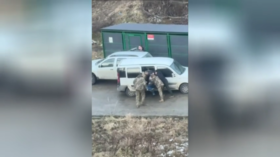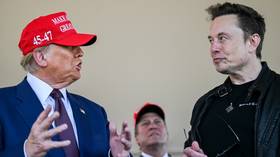'US uses Europe as a bridge-head to attack Eurasia'
The world financial crisis is not just about money though it started on Wall Street, says Tiberio Graziani, editor of Eurasia magazine on geopolitical studies and author of many books on geopolitics.
RT spoke to Graziani in Rome.
RT: Governments worldwide are adopting protectionist measures. It affects all levels of society. In Italy we are seeing more support towards right wing anti-immigration policies. How can Italy and how can we all outlive the world financial crisis?
Tiberio Graziani: First of all, we should reflect on the motives of this financial crunch, which also affected production at an industrial level, first, in the United States and then in the entire Western system, constituted by a famous triumvirate: the US, Western Europe and Japan. This crisis has affected the whole world market. As for Italy, the effects have begun to show slightly later and, in my view, will become more pronounced during 2009 and in 2010.
Because the Italian economy is mainly based on small and medium enterprises, there’s no high concentration of industry, and therefore Italy tends to have more flexibility necessary to face and contain the crisis. Anyway, the crisis will be very deep.
We’ll be able to overcome a financial crisis if we operate in a continental geo-economic context. It means that we should look for recipes in which the economies of the emergent countries such as Russia, China and India are going to have their part. The crisis cannot be resolved only through national recipes or recipes created in Brussels by the European Union only.
RT: Lets talk about the recent gas crisis, Italy has been affected perhaps not as much as the Balkans and Eastern Europe, but still, it was among those taken hostage by it. The truth has been concealed. What is the real origin of the dispute?
T.G.: The origin of the gas dispute between Kiev and Moscow is actually a reflection of NATO enlargement in Eastern Europe as well as EU expansion into Eastern European countries. These two coinciding enlargements were seen in Moscow as a kind of aggression in its close neighbourhood.
This kind of enlargement began in 1989 after the fall of the Berlin Wall. From that moment the United States had decided to manage the whole planet. They chose Western Europe as a starting point to move in the direction of Russia and Central Asia, as it’s known that Central Asia has huge resources of gas and oil.
The US started to influence Warsaw block countries and some former Soviet states, such as Ukraine.
From 1990 Ukraine began to separate its geopolitical future from its natural location, or from Moscow.
If we analyze the so-called ‘Orange Revolution’, we’ll realize that behind these achievements of the so-called civil society of Ukraine were interests coming from across the Atlantic, from Washington. We mustn’t also forget about the influence of so called philanthropists such as George Soros not just in the destabilization of Ukraine, but also in the former Yugoslavian republics.
When Ukraine abandoned or tried to abandon its natural geo-political context, that of a privileged partner of Moscow, it’s evident that when it came to gas, Moscow tried to set market prices for it as Ukraine was no longer a privileged client but a customer like any other. Obviously gas prices went up affecting Europe because Ukraine's leaders lack sovereignty and are driven by other Western interests. Instead of looking for an economic agreement, as is usually done between sovereign countries, Ukraine aggravated the situation by siphoning off gas designated for European nations.
This true reason was neglected by the Eastern European press, including the Italian press. In the gas dispute, the majority of Italian journalists focused their attention not on its real causes, but on the deionization of the Russian government, saying that it had used geo-policy as a weapon in the gas issue, but President Medvedev and Prime Minister Putin were only applying market prices to normal economic transactions concerning gas.
RT: Ukraine is on the verge of default. Russia cannot possibly count on Ukraine paying market prices next year.
T.G.: I believe it’s possible to find an economic agreement. Moscow and Kiev can also negotiate possible discounts. I’d like to stress again that it’s not only a problem of economic transaction, export and import. It’s a geopolitical issue. It’s evident, if Ukraine chooses to set up a Western camp with Washington’s leadership, that’ll affect not only gas, but also other economic issues as well. Hence, I believe, it’ll be possible to find an economic solution, but resistance comes from Kiev, because it depends on Washington’s interests.
RT: While we’re focusing on Washington let's talk about US military bases on Italian soil, what is public opinion here?
T.G.: Most people are aware of the presence of military bases but they aren’t politically conscious. Thus, in the case of the enlargement of a military base in Vicenza, in the north of the country, the main argument was environmental. And the main motive was hidden as, in reality; this enlargement serves the US armed forces, as they’d have the opportunity of contacting a nearby military base, located in Serbia, which also depends on Washington. In future it’ll be possible to operate in border countries and in the Middle East, such states as Syria and Iran and to some extent Russia. The Yugoslavian nation, Serbia in this case, wasn’t chosen by chance, but because it has some cultural and ethnic similarities to Moscow.
RT: The gas crisis has strained Russia-EU relations, many EU states are already looking for alternative suppliers. Does Russia need to worry?
T.G.: No, I don’t think Russia should worry about it. I think every country should look for the best opportunities in the market concerning energy supplies and be self-sufficient. In a wider geo-political context of Eurasia I believe relations between Russia and Europe, between Russia and Italy should be based also on economic interests: exchanging new high technology, military technology, energy resources and, obviously, cultural relations.
I believe cultural relations between the European Union and Italy and, naturally, the Russian Federation should be strengthened.
After WWII, more than sixty years ago, these relations declined because they were undermined by the intellectual class of Europe which supported the Westernization or Americanization of European culture. If we compare European and Italian literature of recent years with the 1930s we’ll notice that many Italian writers use more incorrect language with many borrowed English words. It is a result of cultural colonization which Washington has been carrying out since WWII until today. It’s interesting to note that this tendency is also present in the countries of the former Soviet block.
RT: What is the general line of Italy towards Russia? Can Russians count on Italy to play a part in improving Russia-EU relations?
T.G.: Sure, naturally Italy along with other countries of the European Union is a potential partner of Russia. But to be a real, not just potential, partner Italy should have more liberty and total political sovereignty, which it doesn’t have at present.
I’d like to reiterate that in Italy there are more than 100 military sites depending on the US, which are part of the project of American influence and occupation of the entire European peninsula. Under such conditions there are certain limits for Italy and other countries to express their own interests in their politics and their economy. But it should also be acknowledged that in recent years the economic policy of President Putin before President Medvedev today has laid the ground for Italy to become a true partner of Moscow not only economically but also in politics and, in my view, in a military field as well. Italy is located in the Mediterranean area, and occupies an important strategic position. Besides, Italy’s central position is also vital at a geopolitical level. And it would be correct if it uses it for Eurasian integration.
I believe relations between Italy and Russia are improving, as Italian entrepreneurs are moving in the right direction, because they overcome limitations established by a political power which comes directly from Washington and London.
RT: You’re very critical of Washington, you portray the US almost as an imperial nation almost, but we hardly live in a unilateral world anymore.
T.G.: I’m very critical of Washington because it has included Europe in its own geopolitical space and looks on Europe only as a bridge-head to attack the whole Eurasian ground. It makes me critical, but, of course, the significance of the US should always be taken into account. And the US should also realize that its era as a superpower is over. At present, in the 21st century, on a geo-political level we have a multipolar system with Russia, China, India, the United States and some states in South America, which are also creating their own geo-political entity, I refer to Brazil, Argentina, Chile and Venezuela, and, obviously, Bolivia too. In particular, major liberties which these South-American countries enjoy can allow the European Union to leave the Western camp ruled by the US and Great Britain.
RT: You travel all over Europe’s hotspots and breakaway regions. You were monitoring the election in Transdniester. There is an island off the coast of Sardinia in Italy that’s just declared independence, they say inspired by Abkhazia and South Ossetia. Is there one universal formula on how to deal with separatism?
T.G.: These issues are absolutely different. In Sardinia there is a political movement of separatism, but this is a movement which a few years ago to those people who are in the government of Italy now. As for Transdniester, it’s necessary to view its situation from the geo-strategic point of view. The countries of Moldavia and Romania feel the weight of the United States and NATO. Transdniester is one of the so called frozen conflicts. I think Transdniester’s independence would be interesting, because in this case it’ll become an area the United States won’t be able to enter. It’ll be a territory of liberty from the Eurasian point of view, because Transdniester will have its sovereignty. I don’t analyze this republic judging it by its actual government. I only analyze its geo-strategic and geo-political situation. Thus, Transdniester is a republic, and it means that on its small territory there are no NATO bases.












